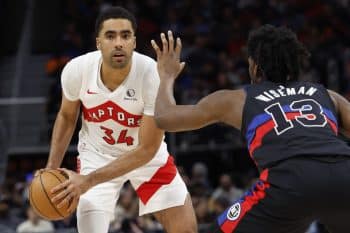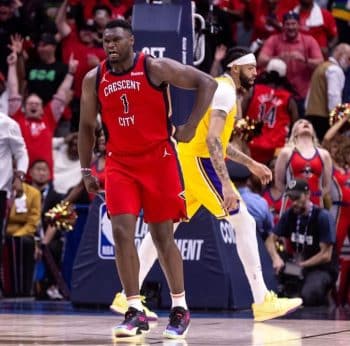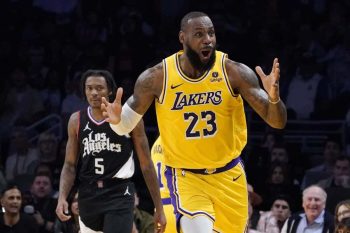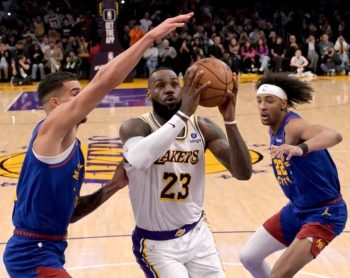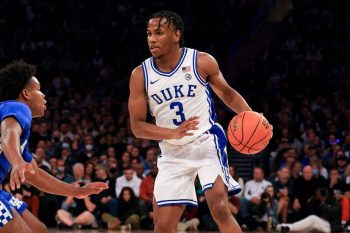Insiders Video
NBA AM: Finding Value Outside of Offense

Chicago Bulls guard Michael Carter-Williams can’t shoot. That was the knock on him coming out of Syracuse in 2013. It was the reason general manager Sam Hinkie traded him from the Philadelphia 76ers after winning Rookie of the Year, and it’s why there are still plenty of really smart basketball people who insist he can’t be a great point guard. In today’s NBA, execs want their point guards to knock down three-pointers. Carter-Williams doesn’t do that particularly well.
In fact, he is a career 25.2 percent shooter from deep, and he’s shooting a career-worst 21.9 percent from long range in his first season in Chicago. It’s not an area of strength for him, and he’ll be the first to admit that.
“I know I’ve struggled in that area in the past,” Carter-Williams told Basketball Insiders. “I’ve struggled some this season, too, but I think it has something to do with my confidence not being where it should be shooting the ball. I’ve been hesitant.”
It’s not like he wants to struggle as a shooter. Like anybody else, he’s working on his weaknesses and hopes to get to a point where it stops being an issue.
“The guys here want me to shoot the ball. If I’m open, they want me to shoot it,” he said. “I’ve been putting in extra time, and I’m getting back that confidence in shooting the ball. It’s something I’m going to improve on for sure, and I think it’s something that’s going to shock a lot of people. I just want to go out and prove not only to myself, but to everybody that I can shoot the ball.”
Carter-Williams wasn’t always a bad shooter. Before heading to college, he often found himself to be the best shooter on the floor.
“In high school, I was just a shooter, to be honest. I shot the ball really well, so I know it’s there,” he said. “But in the NBA, everybody’s much bigger, much faster, much stronger. It’s way different in college and the NBA. The big men are fundamentally a lot better and it’s a different game now. Everyone switches, people go small and shoot more threes. It’s just a whole different game.”
All of that has made shooting the ball more challenging for Carter-Williams, as well as every other college stud that has made the jump to the pros. It’s not uncommon to watch all sorts of NBA players knock down shot after shot after shot during warmups, only to get shut down completely once professional defenders get into their faces.
Like almost every guard in the league, Carter-Williams is a technically apt shooter, but with the tougher defenses, he’s had to find other ways to be effective.
“My game has grown a bunch since high school,” he said. “I’m more of a point guard now. I get others involved, my defense has improved.”
In other words, there’s more to being a good NBA point guard than just shooting threes. That’s the way the game has evolved recently, but as Carter-Williams points out, shooting isn’t the only way to judge a point guard. Defense matters, too, and that’s an area where he excels.
“It’s pretty disappointing that both sides of the ball don’t get equal credit, especially to those who are really good and take a lot of pride defensively, like myself and the Patrick Beverleys,” he said. “This league has just grown into more of an offensive league, and people like to see flash, and that’s the business side part of it. But defense matters, too.”
Part of the problem for Carter-Williams this season in particular was getting traded at the beginning of the season, only to get hurt immediately. It’s difficult to find a rhythm when all those factors are working against you.
“It was hard. I was just learning some of the stuff and then I get hurt, and I’m still trying to adjust to the system, learn the plays and learn the defense,” he said. “It’s still going to take some time, but my coaches have shown trust in me and are being patient with me.”
They’re also giving him more minutes now that head coach Fred Hoiberg has decided that Rajon Rondo is not the direction in which the team wishes to head in terms of a starting point guard.
As for his shooting, it’s something Carter-Williams will continue to work on well into the offseason.
“There will be a lot of practice for sure,” he admitted. “We’ll look at my fundamentals, we’ll watch film, I’ll work on getting my feet right, I’ll make sure I’m on balance. It’s stuff that I’ve gone over a bunch, and I’ll continue to learn, continue to go over it.”
No matter what, though, he doesn’t see himself trying to be something he’s not.
“I don’t want to fall into the jumpshot, I’m still going to be attacking first. I think it’s one of my strengths, and I’ll let my jumpshot come to me.”
This hasn’t been a great season for Carter-Williams or the Chicago Bulls as a team, but Carter-Williams feel as though he’s made a big step toward the next evolution of his game. His shooting isn’t likely to improve a whole lot this season, but he’s committed to doing better moving forward. And even if he never transforms into Stephen Curry, he still brings a lot of really good things to the table as a point guard.
Shooting point guards are nice, and there’s no team in the league that wouldn’t love to get their hands one. That doesn’t mean Carter-Williams is worthless, though. That’s the point he wants to make. There’s still some value in point guards who aren’t a deep threat.
